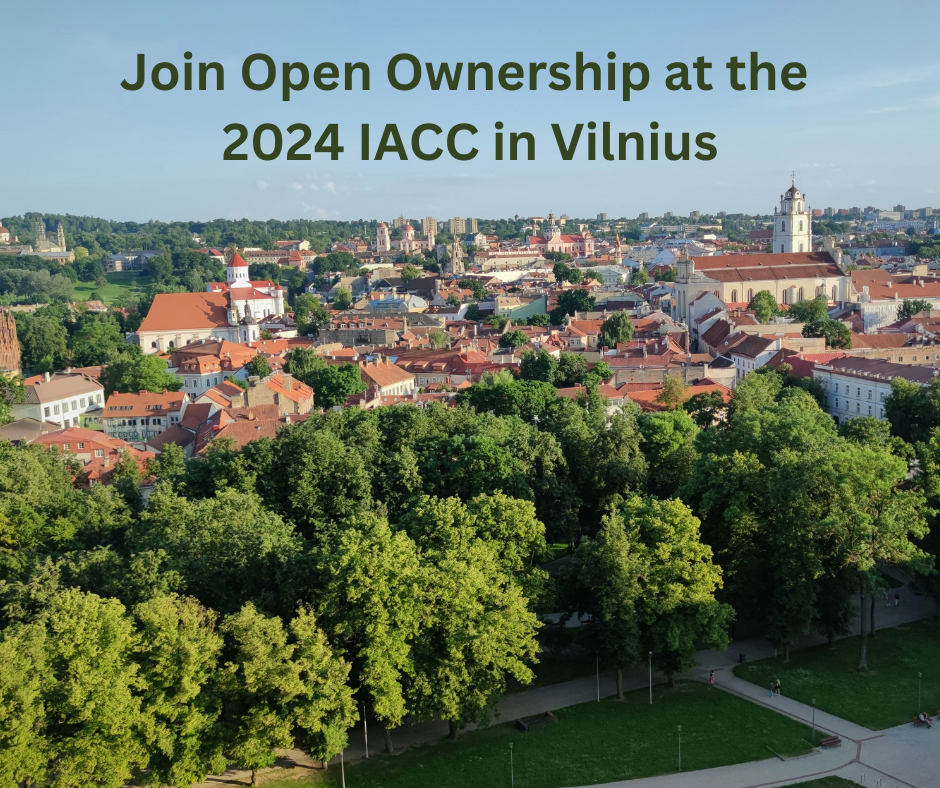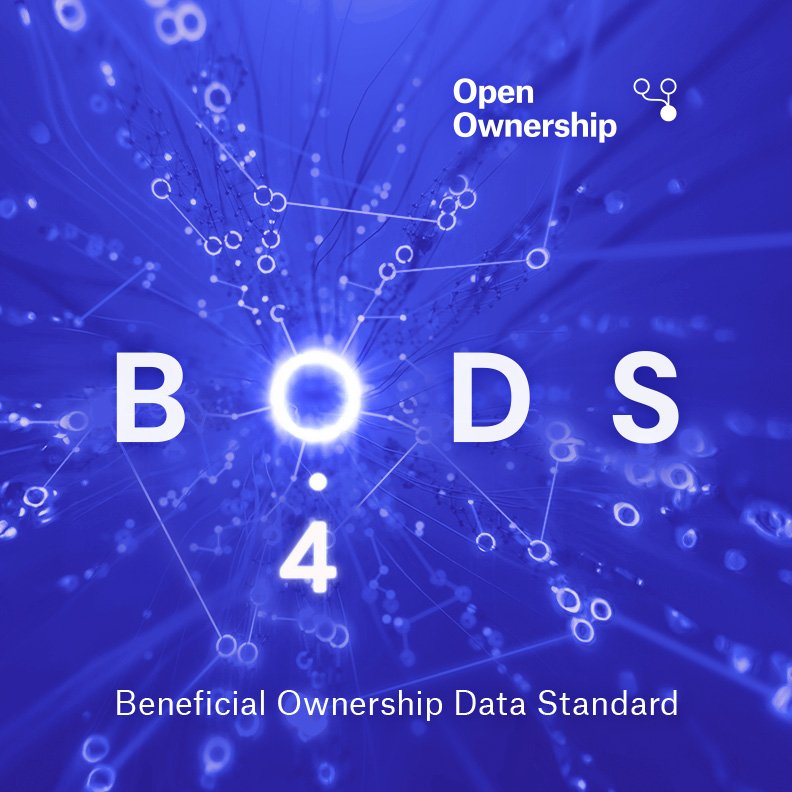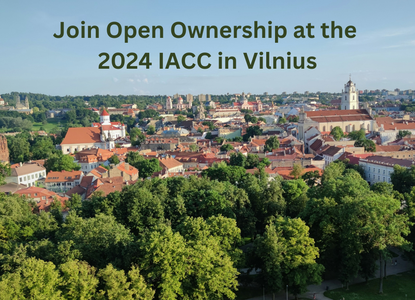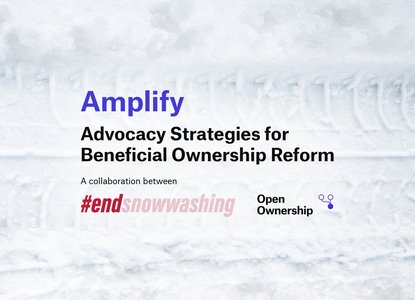Doubling down on fighting corruption with beneficial ownership transparency

This week, the city of Vilnius, Lithuania is hosting the 21st International Anti-Corruption Conference (IACC) – the global forum that brings together heads of state, civil society, international organisations, the private sector, and activists to tackle the increasingly sophisticated challenges posed by corruption.
Time and again, illicit financial flows – the proceeds of corruption and other financial crimes – are moved around the world using anonymously owned companies that contribute to an environment of secrecy. Transnational challenges require transnational solutions: beneficial ownership information (BOI) needs to be connected internationally so that anti-corruption actors can use it to better prevent, detect, and combat corruption.
Here’s how Open Ownership thinks the IACC community can work towards a better environment of beneficial ownership transparency (BOT).
Beneficial ownership’s global policy relevance
Beneficial ownership (BO) as a policy framework remains firmly on the global agenda. As an anti-corruption tool, it has been recognised in new Resolutions 9/7 and 10/6 adopted by the 10th Conference of the States Parties to the United Nations Convention against Corruption in 2021. Its benefits for tackling money laundering and illicit finance are evident, as highlighted by the Financial Action Task Force Recommendations 24 and 25.
We are also seeing the use of BOI in public procurement and political financing having renewed importance, as it is for integrity in the energy transition and screening extractives licences. Additional topics are emerging as drivers for BOT, such as combating tax evasion and domestic resource mobilisation as key areas of discussion for the 4th Financing for Development conference, as well as being a critical tool for climate financing or tackle illegal, unreported and unregulated fishing.
However, a “data use gap” remains. Over 80 countries now have live BO registers, and around 20 are actively working towards launching one. The critical challenge is now to ensure BO data is accessed and used to its fullest potential to prevent and combat transnational corruption. Everyone with a role in the anti-corruption space must have access to high-quality, timely BO data.
The IACC community working together
In order for BOI to reach its full potential, every actor in the anti-corruption community has a role to play. That means:
1. All actors in the fight against corruption need to be able to access and use BO data.
We need to double down efforts on implementation to deliver solid BO registers so that data is well-structured; there is a high rate of corporate compliance; and information is quality-checked. Implementing BO registers is not just technical work: it demands a sustained political will to implement effective reforms that build an enabling environment for accountable and responsible governance. Actors such as domestic and foreign law enforcement, procurement and licensing officials, companies, civil society organisations, and journalists can help prevent and detect corruption. Ensuring these actors have timely access to BOI and its historical records, in conformance with domestic privacy and data protection legislation (but without undue obstacles or barriers), better enables them to use BOI, creating a less-conducive environment to the secrecy that supports and enables corrupt acts.
2. BOI should be linked up to follow the money across borders.
To tackle transnational corruption, the gap between data-sharing requirements in global policy standards and real-world practices needs to be bridged, by scaling the technology solutions to link and share BO data. This means:
- Using digital and innovative technologies to make BO data more usable, whilst also protecting privacy. Leading technology companies are investing in data standards to enhance interoperability and data governance. For example, Microsoft has partnered with Open Ownership to scale the use of the Beneficial Ownership Data Standard (BODS) and increase governments’ ability to use BO data from multiple countries.
- Promoting the adoption of common data standards that enable easy exchange and use of BOI between stakeholders. For example, Canada plans to facilitate interoperability between its federal and sub-national BO registers using BODS.
- Improving exchange of BOI across borders by adapting and scaling new technologies and strengthening legal agreements that enable cross-border data sharing.
- Making government datasets interoperable (for instance, emerging efforts from the Interoperable Europe Act or the upcoming interoperability framework in Kenya), allowing BO registers to be linked with other domestic datasets, such as PEP registers and procurement information. Ukraine is taking solid steps in this direction, building on Prozorro’s success in saving 10% of the country’s budget by working on a Digital Restoration EcoSystem for Accountable Management.
Contributing to all this, this month Open Ownership will launch BODS 0.4, the updated version of our data standard with new features to capture high-quality data on BO relationships and leveraging on countries’ adoption such as Botswana, Canada and Nigeria.

3. Civil society’s role as advocates and users of BO data should be uplifted.
Civil society organisations are not only watchdogs and advocates for BOT reform, but also key users in the ecosystem that can help illuminate findings in investigations such as the Fishrot scandal in Namibia, as well as combining information internationally, such as Argentina’s wind farms case.
Donors and international actors should do more to strengthen and support domestic civil society advocacy that sustains momentum beyond initial policy wins, creating stronger support for the effective implementation of BOT. We need to combine international and local efforts to share experiences and learnings between actors driving reforms in different contexts by forging new partnerships beyond traditional anti-corruption actors. At the IACC, Open Ownership will launch Amplify, our new collaborative project with Canada’s End Snow Washing Coalition. Our aim is to contribute to this global cross-learning and open dialogue, fostering a culture of sharing and collaboration.
This year’s IACC poses a tremendous opportunity to continue building an enabling environment that upscales the availability and use of BOI so there’s nowhere for corrupt actors to hide. The time is now, and action is imperative.
If you are attending the IACC, take a look at the multiple opportunities to meet up with the Open Ownership team. We would love to collaborate with colleagues interested in BOT!

